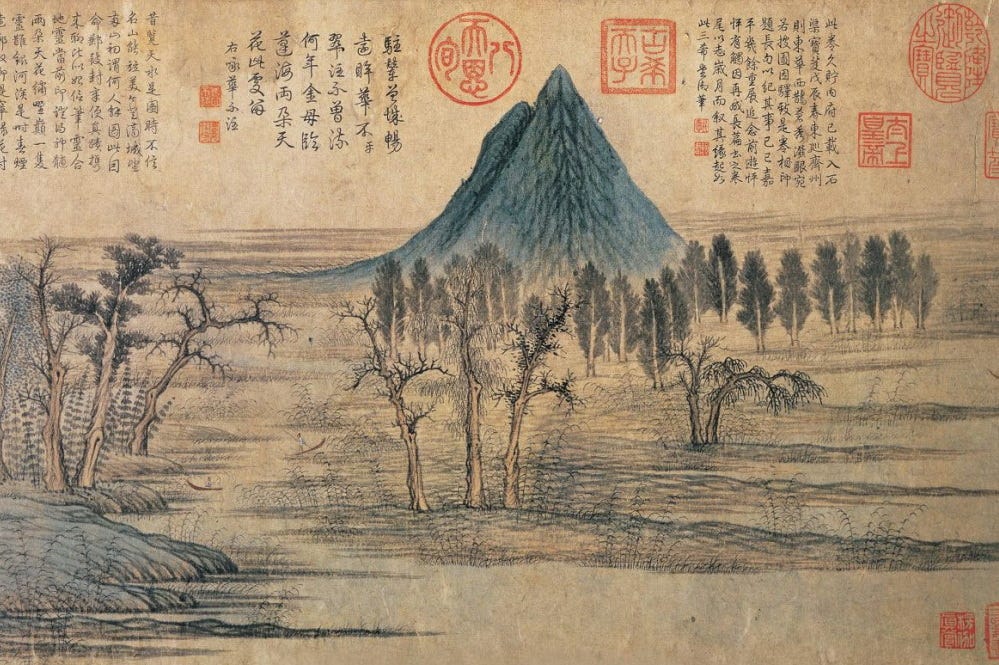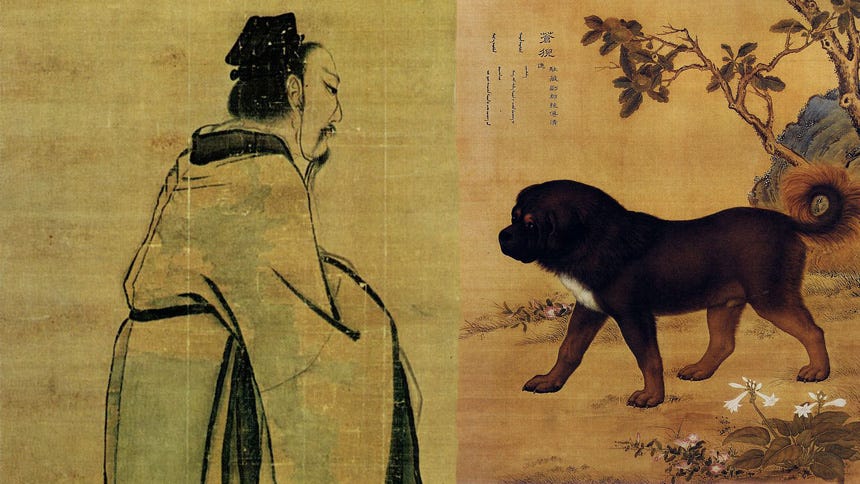The lexicography of yi 異
They will perish, but thou dost endure; they will all wear out like a garment. Thou changest them like raiment, and they pass away. (Ps 102:26)
Well, here’s an interesting one: the character yi 異 (simplified 异), which is glossed in English variously as ‘another’, ‘contrary’, ‘different’, ‘diverse’, ‘strange(r)’, ‘rare’, ‘unexpected’, ‘extraordinary’, even ‘monstrous’. This ideogram denotes something which is somehow at variance or uncommon. In modern Chinese, yi 异 is a prefix in biological scientific terms for which English borrows the Greek prefix hetero-, like heterochromia (yisezheng 异色症), heterogeneous (yizhi 异质) or heterosexual (yixinglian 异性恋).
It is also used in native compounds like liyi 立异 ‘peculiar’, ‘eccentric’; tongyi 同异 ‘compare and contrast’; yichang 异常 ‘abnormal’; yiyan 异言, yiyi 异议 and yishuo 异说 ‘dissent’, ‘dissenting opinion’; yidu 异读 ‘variant pronunciation (of a Chinese character’; yibang 异邦 ‘foreign country’; yike 异客 ‘stranger’, ‘foreigner’; yiming 异名 ‘alias, a.k.a.’; youyi 优异 ‘outstanding’. It is also used with the gloss of ‘spirit’ or ‘spook’, as in guaiyi 怪异 ‘strange thing, monster’ or shenyi 神异 ‘gods and spirits’. It can certainly have commendatory connotations in modern Chinese (particularly youyi 优异!), but the overall thrust in the context of a collectivist society leans toward the pejorative.
There appear to be two accepted etymological derivations for this ideogram. The first is that it represents a human-shaped figure (ren 人) wearing or putting on, using both hands (gong 廾), a mask (tian 田). The second is that it represents a human-shaped figure using both hands to put something or carry something on her head. The second etymology seems to find some support in the use of yi 異 as a component in the character dai 戴, still used in modern times to mean ‘to put on’, ‘to carry on the head’, ‘to bear’, ‘to support’ or ‘to respect’.
There seems to be another, slightly more tenuous connexion, with a different character yi 裔 ‘descendant’ or ‘frontier’. The linkage to our yi 異 at hand is proposed in two ways. First: the notion of ‘putting on’ is attested in the clothing radical yi 衣: the notion being that a ‘descendant’ or succeeding generation is likened to a seasonal ‘change’ or new dressing of foliage (ye 葉 ‘leaf’) on a tree. And second: there is a semantic notion of being ‘outlying’ or ‘distant’ which is attested in the use of jiong 冏 (also 坰, 冋 or 冂) ‘outskirts’, ‘borderland’, ‘wilderness’.
Both directions for this character’s glosses suggest a very tight semantic parallel (perhaps a convergent evolution) between the Sinitic yi 異 and the Semitic triliteral ḥ-l-f ח-ל-ף ‘to change’, ‘to pass on’, ‘to pass through’, ‘to pass by’, ‘to pass away’, ‘alter’, ‘renew’, ‘overstep’. Consider:
The Arabic verbs iḵtalafa اختلف and iḵtilāf اختلاف, from the cognate Arabic stem ḵ-l-f خ ل ف, literally carry the same modern-day gloss as yi 異: ‘to differ’, ‘to dissent’. The adjective muḵtalif مختلف carries the same set of glosses: ‘different’, ‘various’, ‘unlike’, ‘diverse’, ‘distinct from’.
The Hebrew term ḥālaf חלף is also used, like yi 異 or dai 戴, to mean ‘change clothes’ or ‘put on new clothes’: ‘Then Pharaoh sent and called Joseph, and they brought him hastily out of the dungeon; and when he had shaved himself and changed (wayḥallef ויחלּף) his clothes, he came in before Pharaoh.’ (Gen 41:14)
The yi 異 / yi 裔 linkage, of a ‘change’ or ‘succession’ of foliage, is mirrored in the use of ḥālaf חלף as applied to a tree: ‘For there is hope for a tree, if it be cut down, that it will sprout again (yaḥalîf יחליף), and that its shoots will not cease.’ (Job 14:7) Note that the Arabic title ḵalīf خليف ‘caliph, successor to Muḥammad’ operates in exactly the same function as yi 裔!
In the book of Judges, the woman Yā‘ēl (יעל, ‘mountain-goat’) certainly gives the general Sîsǝrā’ (סיסרא, ‘battle array’) a ‘change’ of headwear (yi 異 in the sense of dai 戴). ‘She put her hand to the tent peg and her right hand to the workmen’s mallet; she struck Sisera a blow, she crushed his head, she shattered and pierced (wǝḥālfâ וחלפה) his temple.’ (Jdg 5:26)
It is clearly a good thing in the Hebrew Scriptures when Joseph ‘changed his clothes’ to meet with Pharaoh, as above, and still a better thing when those who are patient and endure in the Lord are given a new surge of strength:
וקוי יהוה יחליפוּ כח יעלוּ אבר כּנּשׁרים ירוּצוּ ולא ייגעוּ ילכוּ ולא ייעפוּ׃
But they who wait for the Lord shall renew their strength, they shall mount up with wings like eagles, they shall run and not be weary, they shall walk and not faint. (Isa 40:31)
But it is a very evil thing for Laban to ‘change… wages’ on Jacob ten times (Gen 31:7 and 31:41), and still worse for the people of God to pollute the earth, violate God’s statutes and break their covenants with God:
והארץ חנפה תּחת ישׁביה כּי־עברוּ תורת חלפוּ חק הפרוּ בּרית עולם׃
The earth lies polluted under its inhabitants; for they have transgressed the laws, violated the statutes, broken the everlasting covenant. (Isa 24:5)
Same root, same word, different function in the text. If it holds true in the Hebrew Scriptures, and in the Greek, then it goes without saying that it is no different in the Qur’an, where the triliteral ḵ-l-f خ ل ف can be either positive or negative. See 10:19 here:
وَمَا كَانَ ٱلنَّاسُ إِلَّآ أُمَّةًۭ وَٰحِدَةًۭ فَٱخْتَلَفُوا۟ ۚ وَلَوْلَا كَلِمَةٌۭ سَبَقَتْ مِن رَّبِّكَ لَقُضِىَ بَيْنَهُمْ فِيمَا فِيهِ يَخْتَلِفُونَ
And mankind was not but one community [united in religion], but [then] they differed. And if not for a word that preceded from your Lord, it would have been judged between them [immediately] concerning that over which they differ.
Judgement is due upon people who differ—that is to say, dispute or squabble, or worse still hurt and kill one another—over matters of religion! Further, it is only the mercy and forbearance of God that prevents such people from being immediately condemned for such ‘differences’. But then, look at 24:55:
وَعَدَ ٱللَّهُ ٱلَّذِينَ ءَامَنُوا۟ مِنكُمْ وَعَمِلُوا۟ ٱلصَّـٰلِحَـٰتِ لَيَسْتَخْلِفَنَّهُمْ فِى ٱلْأَرْضِ كَمَا ٱسْتَخْلَفَ ٱلَّذِينَ مِن قَبْلِهِمْ وَلَيُمَكِّنَنَّ لَهُمْ دِينَهُمُ ٱلَّذِى ٱرْتَضَىٰ لَهُمْ وَلَيُبَدِّلَنَّهُم مِّنۢ بَعْدِ خَوْفِهِمْ أَمْنًۭا ۚ يَعْبُدُونَنِى لَا يُشْرِكُونَ بِى شَيْـًۭٔا ۚ وَمَن كَفَرَ بَعْدَ ذَٰلِكَ فَأُو۟لَـٰٓئِكَ هُمُ ٱلْفَـٰسِقُونَ
Allah has promised those who have believed among you and done righteous deeds that He will surely grant them succession [to authority] upon the earth just as He granted it to those before them and that He will surely establish for them [therein] their religion which He has preferred for them and that He will surely substitute for them, after their fear, security, [for] they worship Me, not associating anything with Me. But whoever disbelieves after that - then those are the defiantly disobedient.
It’s clear here that those who do good works and trust in God will be rewarded with successors—that is to say, different people who will continue what the God-fearing and the workers of good have begun. Same root, same triliteral—different function (and different evaluation!).
So it is too for the term yi 異 in the Chinese Classics. Different tradition, but a parallel message. We can see the positive connotation clearly from the Odes:
自牧歸荑、洵美且異。
匪女之為美、美人之貽。From the pasture lands she gave a shoot of the white grass,
Truly elegant and rare.
It is not you, O grass, that are elegant; -
You are the gift of an elegant girl.Book of Odes, Odes of Bei 邶風, ‘The Retiring Girl’ 靜女 lines 5-6
And also:
穀則異室、死則同穴。
謂予不信、有如皦日。While living, we may have to occupy different apartments;
But when dead, we shall share the same grave.
If you say that I am not sincere,
By the bright sun I swear that I am.Book of Odes, Odes of Wang 王風, ‘His Great Carriage’ 大車 lines 5-6
In each of these Odes, the character yi 異 occurs at the volta, in the last stanza, marking a summation or a shift in perspective in the song. In ‘The Retiring Girl’, the (male) songster remarks on the steppe grass flower that his beloved has given him, not because it is itself remarkable, but for the fact that it was she who gave it to him. Clearly the yi 異 here is meant to remark on how precious and exquisite the gift is because it reminds him of the giver. In ‘His Great Carriage’, the use of yi 異 may seem to be more pejorative… until one remembers the (much-later and perhaps inspired by this Ode) Chinese folktale / opera of Liang and Zhu 梁祝, the ‘Butterfly Lovers’.
In the Butterfly Lovers opera, a tale which dates back to the Eastern Jin Dynasty (266 – 420 AD) following the anarchic Three Kingdoms era, Liang Shanbo 梁山伯 studies together with a young junior named Zhu Yingtai 祝英台, who convinces her reluctant father to let her attend school, and disguises herself as a young man in order to do so. Zhu Yingtai falls in love with her classmate, but (he being book-smart but not too observant) Liang Shanbo fails to notice that she is a woman. He also fails to take the massive, broad, painfully-obvious-to-everyone-but-him hints that Zhu Yingtai drops to him that she badly wants to get, to use the parlance of our times, into his pants.
After they graduate, Liang visits Zhu’s home to catch up with his old school pal, but is told by the house servant that there is no boy named Yingtai at home, only a girl. That’s when Liang finally understands the whole thing and reciprocates Zhu’s affection. But Zhu Yingtai is being pressured by her family to marry a wealthy merchant named Ma Wencai—and Liang Shanbo falls into a decline and dies as a result. The opera ends when Zhu Yingtai’s bridal party passes by Liang’s burial site, and she leaps inside it to be buried together with him in the same grave. In some versions of the story, Liang Shanbo and Zhu Yingtai are transformed into butterflies. ‘The Butterfly Lovers’ borrows its signature motif from ‘His Great Carriage’ 大車, which clearly has a similarly romantic draw for the people of the Zhou Crownlands as the legend of Liang and Zhu did for the opera-goers of the Eastern Jin Dynasty.
However, we also see clear negative connotations to yi 異 in the Classics, particularly in the Book of Documents.
不作無益害有益,功乃成;不貴異物賤用物,民乃足。
When he does not do what is unprofitable to the injury of what is profitable, his merit can be completed. When he does not value strange things to the contemning things that are useful, his people will be able to supply (all that he needs).
Book of Documents, ‘The Hounds of Lu’ 旅獒 verse 2
If the Odes are an imperfect Chinese parallel to the Psalter and the Song, then the Documents are so to the Book of Proverbs. Here, the Grand Protector (taibao 太保) is instructing his prince and cautioning him against too eagerly receiving the gift of some rare hunting dogs from a neighbouring non-Han tribe. The overall thrust of his argument is that a man in a position of power is always tempted to flaunt his wealth and take pleasure in collecting exotic and rare items (yiwu 異物), to the point that he neglects the basic necessities of his people… or worse, exploits and mistreats them. The Grand Protector is telling the king, in no uncertain terms, not to care about gaining or keeping exotic foreign trinkets, but instead to care for his neighbour. Further down the Document, he uses the classical Chinese term for ‘neighbour’ explicitly: erren 邇人 ‘the person who is close at hand to you’!
政貴有恆,辭尚體要,不惟好異。
In measures of government to be consistent and constant, and in proclamations a combination of completeness and brevity, and valuable. There should not be the love of what is extraordinary.
Book of Documents, ‘Charge to the Duke of Bi’ 畢命 verse 3
This is a Zhou king giving a charge to his son, tasked with defending a contested border territory (Bi 畢) on the eastern border of the Zhou. He’s telling his son to attend to his job, to use simple, transparent and uniform measures of justice, and to use plain language that people can understand. (Of course, I would be using the James Legge translation of this Document here, with his voluminous imperialist Victorian sesquipedalianisms, wouldn’t I?)
But the point should be clear. Whether yi 異 is being used in a positive or in a negative way, depends on its function: the same as for its coordinate Semitic triliteral ḥ-l-f ח-ל-ף or ḵ-l-f خ ل ف. The ‘measure’, the ‘standard’ in the case of both traditions of wisdom literature, is how one treats one’s neighbour.
It’s clearly one thing to dress nicely when going to meet the man who let you out of gaol, but entirely another thing to change the laws to suit you, so that the earth is polluted by your industrial waste. Just ask Isaiah.
It’s clearly one thing to ‘abound in the work of the Lord’ (1 Cor 15:58) in the hope that the flesh may be changed into something imperishable (1 Cor 15:52-53), but entirely another thing to exchange the unseen and nonexistent God of Scripture for idols in the shape of men (Rom 1:23). Just ask Paul.
It’s clearly one thing to hand down one’s unfinished works to be completed by the next generation, but entirely another thing to browbeat or slander or slaughter your fellow human beings over theology. Just ask Muḥammad.
In the same way, it’s clearly one thing to appreciate a prairie-grass flower from a pretty girl who likes you, but entirely another thing to accept the gift of, say, a pet tiger while the people around you are in five- or six-figure medical debt. Just ask the Grand Protector of the Zhou.











